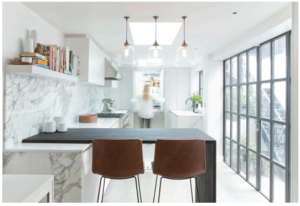
Putting a well-known military adage to work, RFR’s Project Managers look at the holy trinity of budgeting, programming and feasibility when mobilising a refurbishment project. It can be very easy for people to get swept away by grandiose architectural schemes, free-flowing layouts and the gratifying act of picking bespoke kitchens, Italian marbles and specialist wallpapers.
However, there are few scenarios more disappointing and stressful to a client than going through an extensive design process only to find that the cost of the final scheme is way beyond their expectations, disproportionate to the capital value of the property or perhaps not even feasible from a planning or construction perspective.
To improve a client’s overall project experience, we will explore here how to avoid designing in a vacuum. We believe that it is critical to manage a client’s expectations from the outset, drawing on the collective expertise of the project team to plan, design, assess, cost and programme concurrently and dynamically.
A dynamic budget!
Crucial to achieving all of this is the appointment of a Quantity Surveyor early in the design process. Working with the Project Manager and design team, they will generate an initial cost plan that gives a comprehensive overview of all project costs including: a high-level construction contract value, summary of consultants’ fees, a realistic budget for furniture and soft furnishings and, of course, VAT. This holistic view is so rarely given to clients at the beginning of their journey but can save so much future pain, allowing any major surprises to be ironed out and the ship put back on course before the design team are too far progressed and significant fees have been incurred.
At every key stage as the design progresses, a project cost plan should be updated by the Quantity Surveyor, to provide incremental check points of design against budget, give opportunities for the client to amend the designs iteratively and recalibrate as required.
Feasibility
All projects are subject to a number of feasibility constraints including: council planning permissions, listed building consent, licenses to alter (affecting leasehold properties) and party wall awards. In order to avoid abortive design time and escalating fees, it is important that the feasibility of a project is explored in parallel with the design process. A beautiful, luxurious and innovative set of plans are of no use to a client if ultimately they do not comply with the property’s unique regulatory and contractual landscape and are unachievable.
Working in the most affluent boroughs of London, we are more often than not dealing with listed buildings or at least with properties that fall within the curtilage of one of the city’s protected Conservation Areas. Depending on the complexity of the scheme, we draw on the expertise of leading planning and other specialist consultants to collaborate with the design-team, stress-testing their creative plans and, ultimately, streamlining the client’s route to a successful planning consent.
Time is critical With the risk of repeating ourselves, it pays to take your time to mobilise properly when it comes to high-value, complex residential projects. However, once you ultimately start on site, clients are often eager to see progress and the proverbial light at the end of the tunnel! Whilst some people are happy to wait the necessary time to obtain everything they desire from their project, others are driven by family life, wider circumstances and costs and the design scheme and project programme need to fit in with this. These drivers are important to consider and the Project Manager and Quantity Surveyor should guide and interrogate the design team to ensure that the creative vision and the clients’ practical needs are aligned.
Whilst the rewards are rich, taking on a substantial project in London is an intensive and expensive process. From experience, most of our clients find great enjoyment in the process and joy in the outcome provided that expectations are managed, they have full visibility throughout the process and the practical, financial and creative plates are all spinning harmoniously!
Please do contact the team if you would like to discuss a forthcoming project or any of the issues raised in this article. Please do share as you see appropriate.

Nancy Elgarf
Project Director
020 3871 5800
nancy@rfrproperty.com

